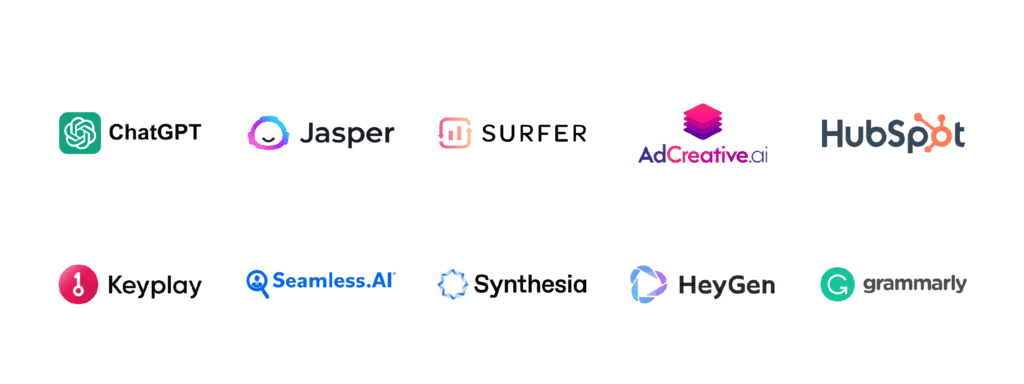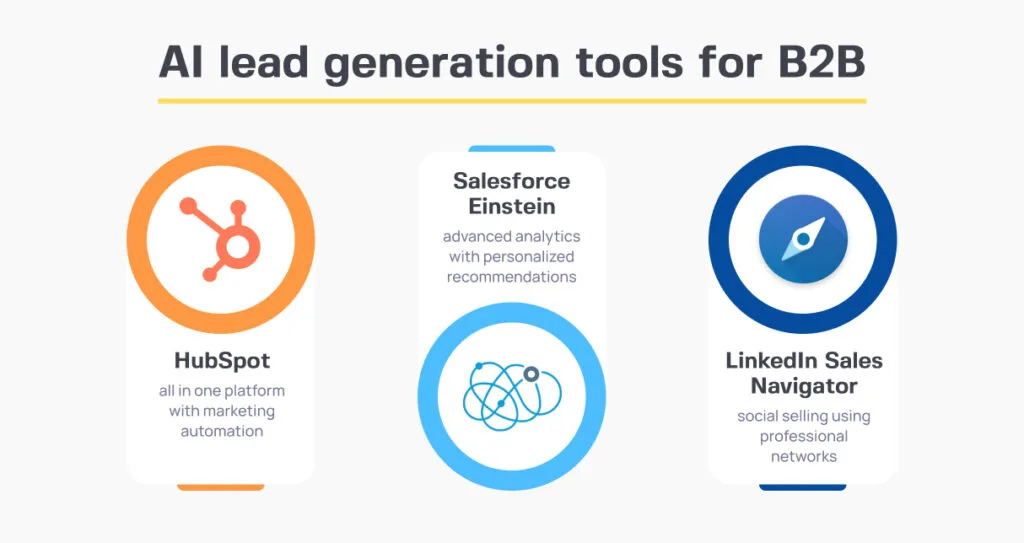The role of Growth Systems For B2B in predictive analytics and forecasting
Transform Your Business: Exactly How AI Automation Is Transforming B2B Procedures
AI automation is improving B2B operations in considerable ways. Companies are adopting this modern technology to streamline workflows and boost efficiency. As tasks come to be automated, companies can concentrate on strategic growth as opposed to mundane procedures. The ramifications of these changes are profound, influencing every little thing from client communications to supply chain monitoring. Understanding this change is necessary, as the future of organization joints on the effective combination of AI right into everyday operations. What lies ahead in this progressing landscape?
Recognizing AI Automation in B2B Context
As companies progressively seek effectiveness, recognizing AI automation within the B2B context becomes crucial. AI automation refers to the application of expert system technologies to streamline and enhance organization procedures. In B2B settings, this can show up in different forms, such as automating data entrance, maximizing supply chain logistics, or enhancing inventory management. Organizations leveraging AI automation can lower operational costs, reduce human mistake, and increase efficiency. Moreover, AI devices can evaluate substantial amounts of data to offer actionable understandings, enabling notified decision-making. Minarik AI. The combination of AI right into B2B procedures not only transforms traditional workflows but also fosters agility and scalability, permitting services to adapt to market changes quickly and effectively. Embracing this technology is essential for staying affordable in today's electronic landscape
Enhancing Customer Experience Via AI
How can AI transform customer communications in the B2B sector? AI improves client experience by giving customized, timely, and efficient service. Smart chatbots and online aides can deal with questions 24/7, making certain customers obtain instant reactions. AI Automation For B2B. Predictive analytics make it possible for businesses to anticipate customer requirements, customizing offerings accordingly. AI-driven systems can analyze consumer information, enabling targeted advertising and marketing approaches and improved engagement. In addition, belief evaluation devices examine customer feedback, helping organizations tweak their solutions. By automating routine tasks, AI frees up human sources to concentrate on high-value communications, fostering more powerful partnerships. The assimilation of AI not only improves interaction however additionally develops trust fund and commitment, inevitably raising the total client experience in the affordable B2B landscape

Simplifying Supply Chain Monitoring With AI
AI plays an important role in maximizing supply chain administration with anticipating analytics and automated inventory control. By leveraging predictive analytics, services can anticipate demand fluctuations and change their operations as necessary. Automated supply systems better improve effectiveness by guaranteeing supply degrees are maintained, lowering waste and boosting overall productivity.
Predictive Analytics Advantages
While several organizations face difficulties in taking care of complicated supply chains, anticipating analytics uses a transformative remedy by leveraging substantial quantities of information to forecast fads and enhance procedures. By evaluating historic information alongside real-time inputs, predictive analytics enables business to determine patterns and expect future needs. This foresight enables for even more enlightened decision-making, enhancing efficiency and minimizing prices. Furthermore, organizations can proactively resolve possible disturbances by forecasting supply chain bottlenecks and adjusting strategies appropriately. The assimilation of anticipating analytics not only boosts supply administration yet additionally fosters stronger connections with distributors and consumers through timely responses to market shifts. Ultimately, the adoption of anticipating analytics encourages companies to remain affordable in an increasingly dynamic company setting.
Automated Stock Control
As businesses increasingly count on anticipating analytics to maximize supply chain procedures, automated stock control becomes a powerful ally in this initiative. By leveraging AI-driven modern technologies, firms can improve precision in inventory tracking, minimize stockouts, and minimize excess inventory. Automated systems examine real-time data, enabling organizations to predict demand variations and readjust supply levels appropriately. This not just simplifies order gratification yet likewise boosts capital administration by minimizing holding costs. In addition, AI can determine patterns in acquiring behavior, making it possible for more enlightened decision-making regarding vendor partnerships and procurement strategies. Eventually, automated inventory control not just improves operational effectiveness yet also improves customer contentment by ensuring item schedule, strengthening its duty as an important part in modern-day supply chain administration.
Data-Driven Decision Making Powered by AI
In today's competitive landscape, companies significantly count on data-driven decision-making to enhance operational effectiveness and calculated planning. Synthetic intelligence plays a crucial duty in this change by assessing substantial quantities of information promptly and properly. AI formulas determine patterns, patterns, and anomalies that human analysts may overlook, allowing services to make enlightened decisions based on real-time understandings. This capability enables companies to forecast market shifts, optimize source allowance, and tailor their offerings to client needs. Furthermore, AI-driven analytics help with danger analysis and monitoring, making sure that organizations can navigate uncertainties successfully. By leveraging these innovative tools, companies not only enhance their decision-making processes however also acquire a competitive advantage in their corresponding markets, cultivating development and innovation.
Automating Repetitive Tasks to Increase Performance

Integrating AI With Existing Business Processes
When integrating AI with existing service procedures, many companies deal with challenges. These difficulties frequently stem from an absence of recognizing regarding just how AI can match current workflows. Effective integration needs an extensive assessment of existing procedures to identify areas where AI can add worth. Organizations must likewise assure that their groups are geared up with the essential skills to leverage AI tools effectively. On top of that, seamless integration rests on the compatibility of AI modern technologies with legacy systems. Companies frequently locate it beneficial to adopt a phased strategy, piloting AI applications in certain departments prior to a more comprehensive rollout. This method enables adjustments based upon preliminary feedback, guaranteeing smoother shifts and making the most of the prospective benefits of AI automation in boosting productivity and performance.
Future Patterns in AI Automation for B2B Firms
As websites B2B business want to the future, boosted data analytics is readied to play an essential role in driving decision-making processes. Smart process automation will also become a vital fad, enhancing and simplifying operations performance. These innovations guarantee to improve just how businesses operate, inevitably resulting in more responsive and nimble organizations.
Boosted Information Analytics
While organizations progressively count on data-driven decisions, the duty of AI in boosting information analytics is coming to be more vital in B2B operations. AI innovations assist in the collection and evaluation of large datasets, allowing business to reveal important insights that drive calculated planning. Anticipating analytics powered by AI enables companies to forecast market trends and customer actions with better accuracy. Furthermore, artificial intelligence algorithms boost information analysis, identifying patterns that human experts might forget. This brings about more educated decision-making and maximized resource allocation - B2B Automation Consulting. As B2B companies remain to accept AI-driven analytics, they can expect better operational effectiveness, boosted client experiences, and an one-upmanship on the market. The future of data analytics in B2B pivots on integrating innovative AI capacities
Intelligent Process Automation
Intelligent Refine Automation (IPA) is positioned to reinvent B2B procedures by perfectly integrating AI innovations with conventional service processes. This ingenious approach integrates robotic process automation (RPA) with innovative AI abilities, making it possible for companies to improve performance and precision. Companies can automate repetitive jobs, such as data access and billing processing, permitting staff members to focus on strategic campaigns. IPA additionally leverages artificial intelligence and all-natural language handling, improving decision-making with real-time data analysis. As organizations progressively adopt IPA, they can anticipate substantial expense reductions and boosted consumer experiences. Future trends suggest a growing dependence on IPA for scalability and adaptability, positioning organizations to thrive in an ever-evolving industry. Welcoming IPA will be essential for maintaining competition in the electronic age.
Regularly Asked Concerns
What Industries Advantage Many From AI Automation in B2B Workflow?
Production, logistics, financing, and healthcare industries benefit most from AI automation in B2B procedures. These markets take advantage of automation to improve performance, lower costs, improve processes, and improve decision-making via anticipating analytics and data-driven insights.
Just How Can Small Companies Carry Out AI Automation Properly?
Small companies can apply AI automation effectively by identifying repetitive tasks, choosing proper devices, incorporating options progressively, educating team, and continually assessing performance to optimize procedures, making sure a smooth transition and making the most of efficiency. AI Automation For B2B.
What Are the Prices Related To AI Automation Implementation?
The prices connected with AI automation implementation commonly include software application acquisition, infrastructure upgrades, training personnel, continuous maintenance, and potential examination fees. These expenses can differ substantially based on the range and intricacy of the automation options selected.
How Do I Determine ROI From AI Automation Initiatives?
To measure ROI from AI automation initiatives, one should analyze price savings, efficiency improvements, and earnings growth against application costs. Tracking vital efficiency signs with time supplies beneficial understandings right into effectiveness and total return on investment.
What Abilities Are Needed to Take Care Of AI Automation Projects?
Reliable administration of AI automation jobs needs skills in task monitoring, data analysis, shows, and understanding AI modern technologies. Additionally, strong interaction, analytic abilities, and adaptability are vital for maneuvering the complexities of such campaigns.
As organizations increasingly look for efficiency, understanding AI automation within the B2B context ends up being essential. The assimilation of AI right into B2B procedures not just transforms traditional workflows but additionally fosters agility and scalability, enabling companies to adapt to market changes quickly and properly. While businesses increasingly depend on data-driven decisions, the duty of AI in boosting data analytics is ending up being a lot more crucial in B2B operations. Intelligent Process Automation (IPA) is poised to transform B2B procedures by flawlessly integrating AI modern technologies with standard organization processes. Effective administration of AI automation projects calls for abilities in job management, information evaluation, programming, and understanding AI innovations.